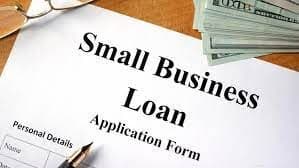If you need money from a bank or the SBA, you need to know how to write a loan request letter. This is because your business loan request letter will be a key part of how your bank’s underwriter evaluates your loan application. A quick business loan does come with certain disadvantages, such as short repayment terms and high-interest rates. There are some factors you need to consider while getting a small business loan. However, this article will guide you on how to get a small business loan, including when you’ll need one, what you’ll need before writing a loan request letter, an example of the format, and the template to use.
What Is a Small Business Loan?
A small business loan provides you with capital to invest in your company. The money could be put to use in a variety of ways, such as providing working capital, financing improvements like upgrades in infrastructure or personnel, or financing business or property acquisitions. A bank considers many factors when determining whether you are eligible for a loan and how much debt your business can afford, including the condition of your business, available collateral, cash flow, and character. The requirements and terms vary depending on the type of loan product you are applying for, so make sure your lender describes what they will need from you to qualify.
What Are The Minimum Requirements For an SBA Loan?
The Small Business Administration has certain criteria that applicants must fulfill before receiving funding:
- You must be legally operating and officially registered as a for-profit business.
- As a business owner, you can’t be out on parole.
- Your company must have fewer than 500 employees and annual revenue of less than $7.5 million over the last three years.
- Your net income (after taxes and excluding carry-over losses) must be less than $5 million, and your tangible net worth must be less than $15 million.
- You must demonstrate that you have “invested equity” by putting your own time and money into the business.
- If you want to do business in the United States, you need to have a physical presence and target customers in the United States and its territories.
- To receive SBA funding, your small business must operate legally and ethically within a specific set of guidelines. Learn more about the industries that are eligible and ineligible for SBA 7(a) loans.
- You must demonstrate that you have tried and failed to obtain funds from other financial lenders, completely exhausting non-SBA loan options.
- prove that you have a good business reason for requesting the loan and that your intended use of the funds is approved by the SBA.
- You must be current on all federal debts (taxes, student loans).
How to Obtain a Small Business Loan
Take the following steps to increase your chances of being approved for an SBA loan:
#1. Build Your Credit
Most SBA loans do not require a minimum credit score, but rather “acceptable” credit. In a moment, we’ll go over the credit score requirements for SBA loans.
If your personal or business credit scores can be improved, you should work on them. For example, you could open a couple of business credit cards and then pay your balance on time, if not in full, every month to begin building a credit history. Take the time to go over your business credit reports and correct any errors or problems.
#2. Design a Business Plan
An SBA loan may not require a business plan. Not all loans or lenders require them. Some, however, will. Even if they don’t, the information in your business plan can give you and the lender the proof you need to show you can pay back the loan. If you don’t have one, you can get free business plan assistance from your local SBDC or a SCORE mentor.
#3. Collateral Documentation
You cannot be denied an SBA loan simply because you lack collateral. However, most SBA loans require you to put up collateral, such as real estate or equipment, if you have it. Find out ahead of time the market value of any assets you intend to use as collateral for the loan.
Keep in mind that a personal guarantee is typically needed for SBA loans. That means you will be personally liable to repay the debt if the company fails to do so.
#4. Obtain Financial and Legal Documents
Prepare to gather business bank account statements, business financial statements, and even personal financial statements if your lender requires them. Some of these may require the assistance of a tax professional, but at the very least, your bookkeeping should be up to date.
The sooner you begin working on these tasks, the better prepared you’ll be when the time comes to apply. Building credit, for example, takes time, so start building or boosting your credit profile before you need funding urgently.
What Type of Loan Is Best for Starting a Business?
The Small Firm Administration’s loan programs( SBA) are often held up as the model for how to finance a new business. They provide large sums of money, extended repayment periods, and low-interest rates in exchange for a minimum of six months to two years of business history and a personal capital investment of 20% to 30%.
Do Banks Give Loans to Startups?
Yes, banks do give loans to startups if they can prove their ability to repay them. In general, this mean borrowers are expected to put up something, usually their home or another large asset.
What Credit Score is Needed for an SBA Loan?
In terms of credit scores, the SBA does not impose any requirements on borrowers seeking an SBA loan. To secure an SBA loan, though, you’ll need a credit score of 620 or above.
Eligibility Requirements for SBA Loan
Each lender and loan program has its own set of eligibility requirements. In general, eligibility is determined by what a business does to generate income, the nature of its ownership, and the location of the business. Normally, businesses must meet SBA size requirements, be able to repay, and have a viable business purpose. Even those with poor credit may be eligible for startup funding. The lender will provide you with a complete list of loan eligibility requirements.
An Example of a Business Loan Application Letter Format
It is recommended that you keep your loan application letter to one page and include the following key elements:
#1. Greeting and Heading
The very top of your loan application letter should include contact information, a subject line as a header, and the following greeting:
- Your name and contact details
- The date you sent your letter
- Your loan agent’s name, title, and contact information
- A subject line stating that you’re writing about a loan and requesting a specific dollar amount
- A salutation
#2. Brief Overview of Your Loan Application
Begin by briefly stating the purpose of your letter as well as the amount you wish to borrow.
- Basic Information About Your Company
- This should include the following:
- The legal name of your company
- The legal structure of your company (sole proprietorship, partnership, limited liability company, S corporation, etc.)
- A summary of your company’s operations
- How long have you been in business?
- How many employees do you have?
- Your revenue and profit for the year
#3. Description of Your Loan’s Purpose
Inform your lender about how you intend to use the loan. Make your goals as specific as possible, using numbers to quantify them. Instead of simply stating that you intend to use the loan for advertising, specify which types of advertising you intend to use, how much each will cost, and the percentage of new customers or increased revenue you expect to gain.
#4. Summarize Your Loan Repayment Capability
- In this section, you should describe your financial situation, focusing on the key information from your financial statements that demonstrates your ability to repay the loan.
- Evidence of your company’s financial health and growth, such as recent profit and loss summaries or balance sheet abstracts.
- Schedules for repaying any existing commercial debts
- Cash-flow projections that show when you’ll be able to budget for principal and interest payments on your loan.
#5. Endings
Your letter should end with:
- A paragraph referring to the financial statements you have attached
- A final paragraph asking the loan officer to review your package and expressing your eagerness to speak with them soon.
- Your signature is required.
- A list of attachments, which includes your financial statements and any other documents required for your loan application. You may also be required to provide financial information for your business partners, such as for SBA-backed loans.
How to Obtain a Quick Business Loan
Borrowing from a lender that specializes in online applications, quick approvals, and fast funding is the quickest way to get a business loan. Many online lenders allow you to prequalify in minutes to see your personalized rates, and after submitting loan documents, you could have business loan funds as soon as the same day as approval.
However, speed isn’t the only consideration when shopping for loans; you should also compare rates and fees to get the best deal. It may take more time to review offers, but it could save you money in the long run.
Prequalifying for multiple business loans through a loan marketplace allows you to compare multiple loan offers at once to find the best loan for your situation.
When Should You Consider a Quick Business Loan?
Businesses that are facing a cash shortage due to seasonal sales or unexpected circumstances need a quick business loan. In this case, a loan can be used to cover operating costs such as payroll until revenue increases or to purchase or repair critical equipment. A quick loan can also enable small business owners to purchase businesses, real estate, or other assets without having to wait for traditional financing to close. This makes it easier to seize opportunities as they arise.
Is It Difficult to Get an SBA Loan?
Sometimes, it is. One of the main reasons it’s tough to secure an SBA loan is that you’re starting a new firm. Traditional lenders consider small business investments to be “risky.” Before they will accept approval, they normally want the business to be at least two years old.
What are the Chances of Getting an SBA Loan?
The acceptance rate for business loans, including SBA loans, is only around 25% at large banks. The approval percentage at small banks is higher—around 49%—but more than half of borrowers are still turned down. So, if you’ve been turned down for an SBA loan, you’re not alone.
What Happens After My SBA Loan is Approved?
Once your loan has been accepted, the following step is to work with your lender to finalize the loan conditions. This includes the interest rate, payback period, and any other terms that were agreed upon. Once everything has been finalized, you will be able to begin using the loan funds.
The cash can be utilized for a variety of objectives, including working capital, equipment or inventory purchases, and business expansion. Some SBA loans, however, include restrictions on how the cash can be used.
How Long Does It Take the SBA to Deposit Money?
After receiving signed documentation, money is normally direct deposited within 3–5 working days. If security is required for the loan, the SBA will create a $25,000 partial disbursement to be submitted to the borrower and will release the remaining funds once all collateral has been properly secured.
Conclusion
The Small Business Administration (SBA) is a wonderful organization that can help business owners gain access to low- or no-collateral funding.
Businesses can obtain loans without collateral outside of the SBA, but it is important to know the terms before signing the contract. Other strict terms or high-interest rates may apply to loans without collateral. If you need to take out a loan for your business, it’s important to know what terms will be most beneficial.
Small Business Loan FAQs
Will there be a PPP loan this year?
No one knows presently, all we know is that the last PPP phased out in May 2021. However, PPP loans aren’t the only source of capital for small businesses. If you need financial assistance, keep reading to find out your available choices.
Do SBA loans have to be paid back?
Loans from the Small Business Administration (SBA) can be used for everything from working capital to fixed assets to marketing. Lenders that work with the Small Business Administration provide financing to qualifying enterprises, with repayment to the lending institution being a condition of the loan.
- SBA LOAN PROCESS: What It Is and How It Works
- BUSINESS LOANS BAD CREDIT: Definition and How to Get It
- BUSINESS LOAN FOR EQUIPMENT: How To Get Business Loans For Equipment
- SBA EXPRESS LOAN: Online Application, Programs, Requirements for any Business






